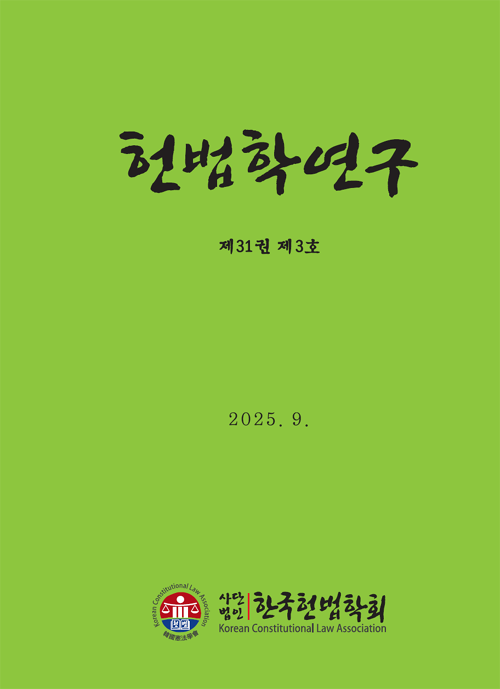- 영문명
- A Constitutional Study on Safeguarding the Independence of the National Human Rights Commission of Korea
- 발행기관
- 한국헌법학회
- 저자명
- 정다영(Da Young Chung)
- 간행물 정보
- 『헌법학연구』第31卷 第3號, 249~276쪽, 전체 28쪽
- 주제분류
- 법학 > 법학
- 파일형태
- 발행일자
- 2025.09.30
6,160원
구매일시로부터 72시간 이내에 다운로드 가능합니다.
이 학술논문 정보는 (주)교보문고와 각 발행기관 사이에 저작물 이용 계약이 체결된 것으로, 교보문고를 통해 제공되고 있습니다.

국문 초록
국가인권기구로서의 국가인권위원회의 설립 목적과 기능은 국제인권규범과 헌법 제10조가 선언한 인간의 존엄과 가치, 그리고 국가의 기본권 보장의무의 제도적 실현과 직접적으로 연결된다. 즉 국가인권위원회는 헌법적 가치와 국제적 인권 원칙을 매개하는 제도적 장치이다. 이러한 점에서 국가인권위원회는 단순한 법률상 독립기관을 넘어, 사실상 헌법기관에 준하는 수준의 독립성과 권한을 갖출 필요가 있다. 그러나 현행 「국가인권위원회법」에 근거한 국가인권위원회 법적 지위와 권한과 관련해 운영의 자율성・재정적 독립성・인사권 행사와 같은 독립성에 있어 핵심적 요소들은 특히 대통령 또는 정부의 결정에 종속될 수 있는 구조적 취약성이 존재한다. 또한 헌법상 입법・행정・사법이란 전통적 권력구조 내 속하지 않는 독립적 국가기구이기에 기본권 보장을 위한 직무수행 과정에서 전통적 권력기관과 권한의 충돌이나 긴장의 가능성을 구조적으로 내포하고 있다.
한편 최근 국가인귄위원회에서 불거진 일련의 상황들을 통해 독립성 또한 민주적 통제의 원리에서 완전히 벗어날 수 없다는 점이 부각되었다. 그러나 독립성과 민주적 통제는 상충하는 가치가 아닌 헌법적 설계에 따라 조화될 수 있는 가치이며, 민주적 통제가 다수의 일방적 지배로 변질되지 않도록 하기 위해서는 정교한 제도적 균형 방안 설계가 중요하다. 아울러 독립성의 강화는 국가인권위원회가 본연을 기능을 충실히 수행하기 위한 토대가 되며, 동시에 전문성과 책임성을 높이는 기반이 된다. 전문성과 책임성의 제고는 국가인권위원회의 독립성을 실질적으로 강화하는 요인으로 작용함으로써, 양자는 상호 보완적 관계 속에서 기관의 신뢰성 확보에 기여한다. 이러한 차원에서, 본 논문은 국가인권위원회가 국민적 신뢰를 공고히 하고 인권 보호와 증진이라는 국제적・헌법적 책무를 충실히 수행할 수 있도록 독립성 확보와 관련된 헌법적 쟁점을 검토하였으며, 민주적 통제 원리와의 조화를 위해 전문성・책임성 등의 강화 방안도 함께 고찰해보고자 하였다.
영문 초록
The establishment and functions of the National Human Rights Commission, as a national human rights institution, are closely linked to international human rights norms, the dignity and value of the human being as proclaimed in Article 10 of the Constitution, and the institutional realization of the State’s duty to guarantee fundamental rights. It functions as an institutional mechanism mediating between constitutional values and international human rights principles. For this reason, the Commission requires a level of independence and authority comparable to that of a constitutional organ, rather than remaining a merely statutory independent body. However, under the current National Human Rights Commission Act, key elements of independence—such as operational autonomy, financial independence, and control over personnel matters—remain structurally vulnerable to subordination to decisions of the President or the executive branch. Moreover, as an independent national institution situated outside the traditional constitutional powers of legislation, administration, and adjudication, the Commission inherently bears the potential for conflicts or tensions with these branches in the performance of its duties to safeguard fundamental rights.
At the same time, a series of recent developments concerning the Commission has highlighted that its independence cannot be entirely exempt from the principle of democratic accountability. Yet independence and democratic control are not inherently conflicting values; rather, they can be harmonized within a constitutional design. To prevent democratic control from degenerating into unilateral domination by the majority, it is essential to establish a carefully calibrated institutional balance. Furthermore, the strengthening of independence provides the foundation for the Commission to faithfully perform its essential functions, while at the same time serving as the basis for enhancing its expertise and accountability. The advancement of expertise and accountability, in turn, operates as a factor that substantively reinforces the Commission’s independence. In this mutually complementary relationship, both values contribute to securing the credibility of the institution. In this context, this article examines the constitutional issues surrounding the independence of the National Human Rights Commission, with a view to enabling it to consolidate public trust and to faithfully discharge its international and constitutional mandate of protecting and promoting human rights. It also explores ways to strengthen expertise and accountability as means of harmonizing independence with the principle of democratic accountability.
목차
Ⅰ. 들어가며
Ⅱ. 국가인권위원회의 법적 지위와 권한의 한계
Ⅲ. 국가인권위원회 운영의 자율성과 한계
Ⅳ. 국가인권위원회 재정의 독립성과 통제
Ⅴ. 국가인권위원회 인권위원 구성의 문제와 전문성·책임성의 확보
Ⅵ. 맺음말
참고문헌
키워드
해당간행물 수록 논문
- 헌법학연구 제31권 제3호 목차
- 민주공화적 권력구조로의 개헌방안 - 다단계 협치론을 중심으로
- 법제처 법령해석제도의 헌법상 의의와 한계
- 국민주권 의미에서 소버린 AI의 실현 방향
- 국회의원 선거구획정위원회에 관한 헌법적 연구
- 공직선거법상 비례대표 국회의원 후보자의 공개장소에서의 연설ㆍ대담 금지규정에 관한 헌법적 검토
- 국회의원의 세대 간 불균형에 관한 헌법적 고찰
- 디지털사회전환(DX)과 미래농업을 위한 헌법적 과제
- 국가인권위원회의 독립성 보장에 관한 헌법적 고찰
- 남성 병역의무 부담에 관한 헌법재판소의 평등심사 연구 - 갈등극복과 사회통합을 위한 합리적 이유논증의 필요성
- 연령차별의 합리성에 대한 재고 - 정년제도를 중심으로
- 알고리즘 시대 공론장의 위기와 표현의 자유
- SNS상의 표현의 자유의 한계 - 미국 수정헌법 제1조의 해석과 미국 연방대법원의 진정한 위협(true threats)의 적용 범위를 중심으로
- 「교원의 학생생활지도에 관한 고시」에 관한 헌법적 검토
- 아동학대 예방 및 처벌 규정의 헌법적 소고 - 아동복지법과 아동학대특례법의 주요 헌법적 분쟁사례를 중심으로
- 신 일리학파(Neo-Elyian)의 비교정치과정 이론과 약한 사법심사
참고문헌
관련논문
법학 > 법학분야 BEST
- 인공지능 판사, 과연 가능한가?
- 정치의 사법화와 사법의 정치화 : 온건하고 실용적인 헌법재판의 당위성
- 자국 우선주의 정책과 국제법상 난민⋅이민자 보호-트럼프 행정부의 미국 우선주의를 중심으로-
최근 이용한 논문
교보eBook 첫 방문을 환영 합니다!

신규가입 혜택 지급이 완료 되었습니다.
바로 사용 가능한 교보e캐시 1,000원 (유효기간 7일)
지금 바로 교보eBook의 다양한 콘텐츠를 이용해 보세요!



